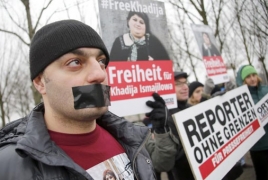
Over the years, Azerbaijan’s pro-government trolls have become a textbook case of state-level social media manipulation, Newsweek says in an article about states and other political actors that use social media to manipulate public opinion around the world.
President Ilham Aliyev has been the country’s leader for the past 14 years, and his grip is only tightening. In February, he took the unprecedented step of making his wife vice-president.
Social media has been a part of his presidential strategy since at least 2010, when members of the country’s main youth group, IRELI, were instructed to proliferate pro-government opinions online. As troll training-centers multiplied across the country—one source says there were 52 in different towns and cities, funded with government money—a few hundred young volunteer-bloggers became tens of thousands of trained trolls.
At first, they were encouraged to become bloggers, painting a positive picture of the country, but focus slowly switched to email-attacks on critics, managing Wikipedia pages and running promotional campaigns on social media. As the group’s then-secretary general, explained in 2011 to the national online news-agency, News.AZ: “Activity and scale of internet users are decisive in this regard. Our objective is to produce young people who can take an active part in the information war.”
IRELI’s influence began to fade due to internal politics around 2014 but the youth branch of the ruling Yeni (New) Azerbaijan Party took over. Youth organizations are favoured as cybertroops around the world because they are cheap, more adept at social media and easily rewarded with government positions or scholarships.
In Yeni’s case, the methods are blunter than their predecessors: The language is more aggressive, violent and degrading, with an emphasis on scale rather than subtlety, with opposition journalists routinely harassed. Personal attacks are typically taken as the best line of defence. Occasionally the ongoing conflict with neighboring Armenia is invoked to drown out online discussions of domestic human rights abuses with so-called “whataboutism”.
“IRELI’s trolls were more educated,” Arzu Geybulla, an Azerbaijani journalist and activist who lives in Turkey, says. “But the government’s trolls have become more active and effective, particularly on Twitter. Whenever Azerbaijan is discussed at a conference and there is online activity, they hijack the hashtags and make sure they dominate the debate.”
The OII reports that these tactics have been largely successful, with engagement in online political discussion having fallen, but Geybulla, who has been a victim of the trolls herself, says this is not the only story. “Social media platforms are becoming increasingly important for the opposition’s attempts to get around Aliyev’s authoritarian control. Access to opposition media outlets has been blocked since May,” she says.
There is also worrying evidence that the government is finding new roles for social media. Last month, 60 people were reportedly arrested in Azerbaijan in an unprecedented crackdown on LGBT rights, with fake profiles allegedly being set up to locate them.

